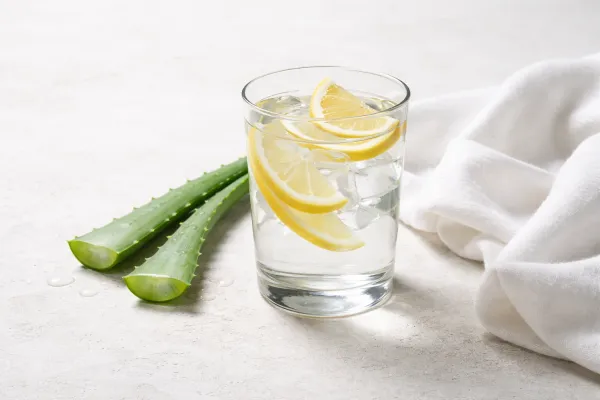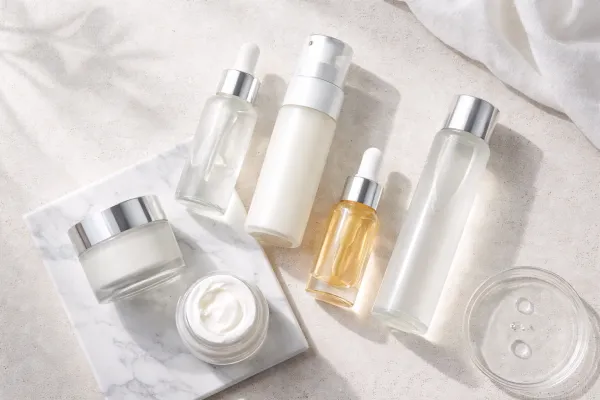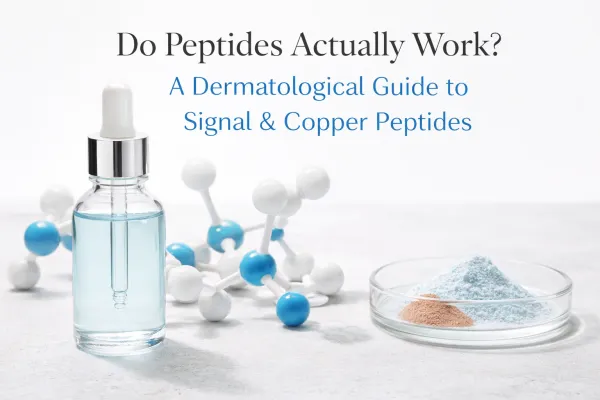Best Ingredients for Skin Barrier Repair: The Ultimate Guide to Healthy Skin
Discover the best ingredients for skin barrier repair and restore your skin's natural protective layer. Learn about ceramides, niacinamide, hyaluronic acid, and more from a dermatologist's perspective.

Ever felt like your skin is just… off?
Dry, itchy, sensitive, maybe even breaking out more than usual? You might have a damaged skin barrier.
Finding the best ingredients for skin barrier repair is like finding the right tools to rebuild a wall – it takes the right materials to get the job done.
And trust me, a strong skin barrier is your first line of defense against a world of trouble.
Key Takeaways about Best Ingredients for Skin Barrier Repair
- Ceramides: The building blocks of your skin barrier, these lipids hold everything together.
- Niacinamide: A multi-tasker that boosts ceramide production and calms inflammation.
- Hyaluronic Acid: A hydration hero that draws moisture into the skin.
- Fatty Acids: Nourishing oils that strengthen and protect.
- Squalane: Locks in moisture and keeps your skin supple.
Best Ingredients for Skin Barrier Repair
Understanding the Skin Barrier
Your skin barrier is like a brick wall.
Each brick is a skin cell, and the mortar holding them together is made up of lipids, including ceramides, cholesterol, and fatty acids.
This barrier keeps the good stuff in (like moisture) and the bad stuff out (like irritants and pollutants). When this barrier is compromised, your skin becomes vulnerable, leading to dryness, irritation, and a host of other problems.
Ceramides: The Foundation of a Healthy Barrier
Ceramides are the MVPs of skin barrier repair.

They're like the cement that holds your skin cells together, creating a strong, resilient barrier. Without enough ceramides, your skin loses moisture, becomes dry, and is more susceptible to irritation.
Think of it like a wall with crumbling mortar – it’s not going to hold up well. Using products with ceramides is like giving your skin the building blocks it needs to repair itself.
Niacinamide: The Multi-Tasking Powerhouse
Niacinamide is a true all-rounder.
Not only does it boost ceramide production, but it also reduces inflammation and improves skin hydration. It’s like having a foreman on your skin barrier construction site, making sure everything runs smoothly.
I’ve seen firsthand in my practice how effective niacinamide can be for restoring a healthy skin barrier. A 2-4% concentration is the sweet spot for optimal results.
Fatty Acids and Plant Oils: Nourishment for Your Skin
Fatty acids, found in plant oils like borage oil, evening primrose oil, and jojoba oil, are essential for skin barrier health.
They provide nourishment and support, strengthening the barrier and improving its ability to retain moisture.
Think of them as the scaffolding that supports the wall while it's being rebuilt. I often recommend these oils to my clients with dry or compromised skin, and the results are impressive.
Hyaluronic Acid: The Hydration Magnet
Hyaluronic acid is a humectant, meaning it attracts and holds onto water.
It’s like a sponge that draws moisture into the skin, keeping it plump and hydrated.
This is crucial for a healthy skin barrier, as dehydration can weaken the barrier and lead to further damage. Hyaluronic acid is a staple in many of my recommended skincare routines.
Squalane: Locking in Moisture
Squalane, a derivative of squalene (naturally found in your skin), is a lightweight oil that locks moisture into the skin.
It’s like sealing the wall to protect it from the elements. Squalane is non-comedogenic, meaning it won’t clog pores, making it suitable for even the most sensitive skin types.
Colloidal Oatmeal: Soothing and Protecting
Colloidal oatmeal is a gentle ingredient that soothes irritated skin and helps prevent moisture loss.
It’s like adding a protective layer over the wall to shield it from further damage. I often recommend colloidal oatmeal products to clients with eczema or other inflammatory skin conditions.
Probiotics and Prebiotics: Balancing Your Skin's Microbiome
Probiotics and prebiotics support a healthy skin microbiome, which is essential for a strong barrier.
They help balance the skin’s pH and reduce inflammation, creating a more hospitable environment for beneficial bacteria. Think of them as the gardeners tending to the landscape around the wall, ensuring everything is in balance.
Occlusive Ingredients: Sealing the Deal
Occlusives, like ceramides, squalane, and various plant oils, create a protective seal on the skin’s surface, preventing moisture loss.
They’re like the final coat of paint on the wall, providing a barrier against the outside world. Occlusives are especially beneficial for dry or dehydrated skin.
Additional Beneficial Ingredients
- Glycerin: Another humectant that attracts and retains moisture.
- Urea (Carbamide): Helps in natural moisturizing.
- Beta-Glucan: Supports skin barrier function.
- SPF: Protects the skin barrier from UV damage. See our article on Sunscreens for Darker Skin Tones for more information.
Building Your Skin Barrier Repair Routine
Now that you know the key ingredients, it’s time to build a routine.
Start with a gentle cleanser, followed by a serum or treatment containing one or more of the ingredients mentioned above.
Finish with a moisturizer to lock everything in. Consistency is key – it takes time to repair a damaged skin barrier. For those with sensitive skin, check out our Skincare Routine for Sensitive Skin.
Top Ingredients for Skin Barrier Repair
1. Ceramides
Ceramides are lipids naturally found in the skin. They help strengthen the barrier by sealing in moisture and protecting against environmental damage. Look for products containing "ceramide NP" or "ceramide AP" for best results.
2. Hyaluronic Acid
Known for its hydrating properties, hyaluronic acid attracts and retains moisture in the skin. Use serums with a high concentration for deep hydration and plump, healthy-looking skin.
3. Niacinamide
This powerhouse ingredient improves skin elasticity, enhances the barrier's function, and reduces redness and irritation. Niacinamide is ideal for sensitive or damaged skin.
4. Fatty Acids
Essential fatty acids, like omega-3 and omega-6, replenish the lipid layer and improve skin flexibility. They are found in oils such as argan, jojoba, and sunflower oil.
5. Glycerin
A humectant that draws moisture into the skin, glycerin is a gentle yet effective ingredient for keeping the skin barrier hydrated and supple.
6. Panthenol
Also known as pro-vitamin B5, panthenol soothes irritated skin and helps repair damage. It's particularly useful for inflamed or sensitive skin types.
7. Cholesterol
Cholesterol is another key lipid in the skin's barrier. It works alongside ceramides and fatty acids to restore the natural protective layer and prevent water loss.
8. Aloe Vera
Aloe vera is a natural moisturizer that soothes and calms irritated skin. Look for products with high aloe content to promote healing and hydration.
9. Peptides
Peptides are amino acids that boost collagen production and enhance the skin's repair process. They strengthen the barrier over time and improve skin texture.
10. Squalane
Squalane is a lightweight oil that mimics the skin's natural sebum. It hydrates without clogging pores and helps to maintain a healthy skin barrier.
Expert Tips for Skin Barrier Repair
- Patch test new products: This is especially important for sensitive skin.
- Avoid harsh ingredients: Fragrances, sulfates, and certain alcohols can irritate a damaged barrier.
- Be patient: It takes time to see results.
- Consult a dermatologist: If you’re not sure where to start, a dermatologist can help you create a personalized routine.
The Importance of a Healthy Skin Barrier
A healthy skin barrier is essential for healthy, radiant skin. It protects against environmental aggressors, prevents moisture loss, and keeps your skin looking its best. Investing in skin barrier repair is an investment in your overall skin health.
Long-Term Benefits of Barrier Repair
Repairing your skin barrier can lead to long-term benefits, including reduced sensitivity, improved hydration, and a more youthful complexion. It’s like giving your skin a fresh start.
Common Mistakes to Avoid
- Over-exfoliating: This can strip away essential lipids and further damage the barrier.
- Using too many products: Stick to a simple routine with effective ingredients.
- Not wearing sunscreen: UV damage can weaken the barrier.
Conclusion
Repairing your skin barrier is like rebuilding a strong foundation for your skin’s health.
By incorporating the right ingredients into your skincare routine, you can restore your skin's natural defenses and achieve a healthier, more resilient complexion.
Remember, consistency is key, and with patience and the right approach, you can achieve lasting results.
For those interested in learning more about their skin barrier, I recommend reading What is the Skin Barrier?.
Frequently Asked Questions
How long does it take to repair a damaged skin barrier?
It can take several weeks or even months to fully repair a damaged skin barrier. It depends on the severity of the damage and the individual, but with consistent use of barrier-repairing products and gentle skincare practices, you can typically see improvements within 2-6 weeks. Remember, skin barrier repair is a marathon, not a sprint. Be patient and persistent, and you'll reap the rewards. Results can vary depending on the severity of the barrier damage and the specific product used. Some people may notice improvements within days, while others may take several weeks.
Can I use multiple barrier-repairing ingredients at once?
Yes, you can combine ingredients like ceramides, niacinamide, and hyaluronic acid for optimal results. Ceramides are like the mortar between the bricks (skin cells) of your skin barrier. They're essential lipids that help maintain the barrier's structure and prevent moisture loss. Niacinamide, also known as vitamin B3, is a true multi-tasker for sensitive skin. It helps boost the skin's natural production of ceramides, strengthens the skin barrier, reduces redness and inflammation, and even helps regulate oil production. Hyaluronic acid (HA) is a humectant, meaning it attracts and holds onto water like a magnet. It can hold up to 1000 times its weight in water! This makes it a powerhouse for hydrating sensitive skin without clogging pores or causing irritation. When your skin is properly hydrated, the skin barrier can function more effectively. Hydration is about increasing the water content of your skin, while moisturization is about preventing that water from escaping. Think of it like this: hydration is like filling a bucket with water, and moisturization is like putting a lid on it to keep the water from evaporating. You need both for optimal skin barrier repair.
What are the signs of a damaged skin barrier?
Common signs include dryness, itchiness, redness, and increased sensitivity. Is your skin throwing a tantrum? Redness, dryness, flaking, itching, stinging, and increased sensitivity to products you used to tolerate are all signs of a compromised skin barrier. Your skin might feel tight, rough, or even develop tiny cracks. Breakouts can also occur because a weakened barrier allows bacteria to penetrate more easily. Think of it as your skin waving a white flag, signaling it needs help. Signs of an imbalanced skin pH include: Excessive dryness or flaking, Redness and irritation, Increased sensitivity, Breakouts or acne, Tightness or discomfort after cleansing. If you experience any of these symptoms, consider evaluating the pH of your skincare products and adjusting your routine accordingly.
Is it necessary to see a dermatologist for skin barrier repair?
While not always necessary, consulting a dermatologist can be helpful, especially if you have persistent skin issues. For mild cases, you can repair a compromised barrier with gentle products and good habits. However, if you experience: Persistent skin sensitivity, Repeated skin infections, Chronic conditions like dermatitis, ...it's time to see a dermatologist. They can tailor treatments to your skin's needs. Dermatologists are essential for diagnosing and treating conditions related to a compromised skin barrier. Consulting a dermatologist ensures you're not just guessing about your skin's needs. If you see a spot or other sign that could be skin cancer, immediately make an appointment to see a board-certified dermatologist. Dermatologists are skin cancer experts. Your dermatologist knows how to identify skin cancer in all skin tones. That's important since skin cancer can appear differently in darker skin tones than in lighter skin tones.
Can diet affect my skin barrier?
Yes, a healthy diet rich in antioxidants and essential fatty acids can support skin barrier health. While your diet won't directly alter your skin's pH, it can impact your overall health, which in turn affects your skin. A balanced diet rich in antioxidants, vitamins, and essential fatty acids supports healthy skin function. Staying hydrated by drinking plenty of water is also crucial. Besides using the right moisturizer, several lifestyle factors can support barrier repair: Healthy Diet: Eat a balanced diet rich in omega-3 fatty acids, Hydration: Drink plenty of water. A diet rich in whole, healthy foods provides your skin with the nutrients it needs to repair itself. Conversely, a diet high in processed foods, sugar, and unhealthy fats can contribute to inflammation and weaken your skin barrier. Your lifestyle choices can make or break your skin barrier.




